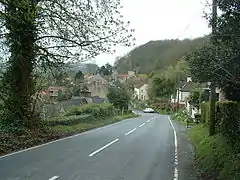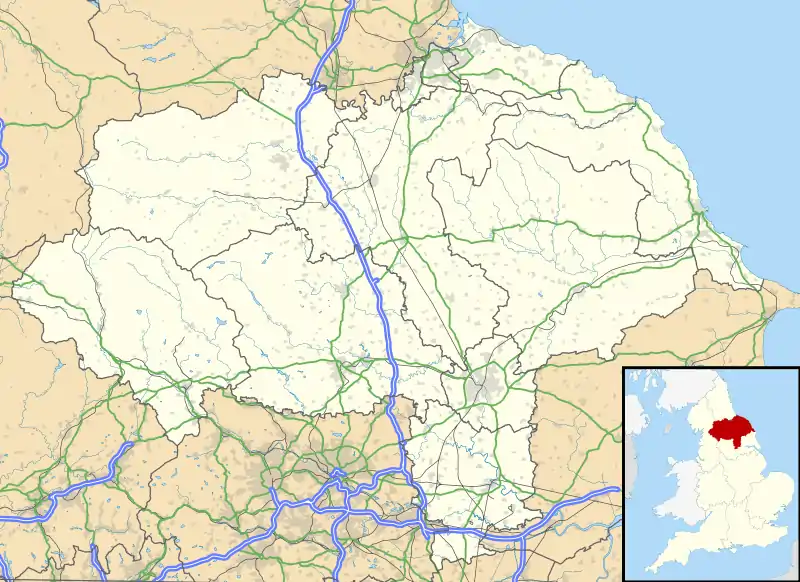Oswaldkirk
Oswaldkirk is a small village and civil parish 4 miles (6.4 km) south of Helmsley and 20 miles (32 km) north of York in the Ryedale district of North Yorkshire, England. It is named after the village church of St Oswald, King and Martyr, the Anglo-Saxon King of Northumbria who was slain by the pagan, Penda in 642. There is also a Catholic church, dedicated to St Aidan. The population of the village as taken at the 2011 census was 230.[1]
| Oswaldkirk | |
|---|---|
 View of village from Oswaldkirk Bank | |
 Oswaldkirk Location within North Yorkshire | |
| Population | 230 |
| OS grid reference | SE 6239 7909 |
| Civil parish |
|
| District | |
| Shire county | |
| Region | |
| Country | England |
| Sovereign state | United Kingdom |
| Post town | York |
| Postcode district | YO62 |
| Dialling code | 01439 |
| Police | North Yorkshire |
| Fire | North Yorkshire |
| Ambulance | Yorkshire |
| UK Parliament |
|
The village is situated at the junction of the roads B1257 and B1363 and straddles the boundaries of the North York Moors National Park and the Howardian Hills Area of Outstanding Natural Beauty. Non-ecclesiastical amenities include a playground, a village hall and a pub called "The Malt Shovel". The Millennium Trail, a circular waymarked walk around Oswaldkirk, takes in the major historical sites and points of interest. The village is also on the path of the Ebor Way.
Each year the village holds a Safari Lunch,[2] a Cricket match and a Bonfire. Every two years there is a benefice Hog Roast (Ampleforth, Gilling East, Stonegrave & Oswaldkirk).[3] In 2002 the village community wrote a book entitled Oswaldkirk: A Living Village.[4] In 2008, the village reached the North of England Finals in the Calor village of the year competition, and was placed first in the "people" category.[5]
Geology
Oswaldkirk is situated to the south of a steep hill, known as "Oswaldkirk Hagg". Many springs rise along the base of the hill, at the boundary of the Kimmeridge Clay and the Corallian Oolite. The latter was mined into the twentieth century in numerous quarries on the hagg between Oswaldkirk and Ampleforth, and fossils from the limestone, especially gastropods, are often found in the village.
History
The first recorded reference to Oswaldkirk was in the Domesday Book (1086). It was referred to as "Oswaldecherca" or "Oswaldecherce" (Oswald's Church).
Oswaldkirk Hall, a Grade II* listed building, was built c. 1690 for William Moor and is one of eight listed buildings or structures in the parish.[6]
References
- UK Census (2011). "Local Area Report – Oswaldkirk Parish (E04007615)". Nomis. Office for National Statistics. Retrieved 31 October 2020.
- http://www.oswaldkirk.org/StopPress.html
- http://www.oswaldkirk.org/PM%20Minutes/Aug%2011.pdf
- "Oswaldkirk: A Living Village". Archived from the original on 29 March 2012. Retrieved 15 October 2011.
- Certificate in Village Hall
- https://britishlistedbuildings.co.uk/england/oswaldkirk-ryedale-north-yorkshire#.X4v8bC14WhA:/